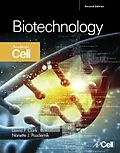Biotechnology, Second Edition approaches modern biotechnology from a molecular basis, which has grown out of increasing biochemical understanding of genetics and physiology. Using straightforward, less-technical jargon, Clark and Pazdernik introduce each chapter with basic concepts that develop into more specific and detailed applications. This up-to-date text covers a wide realm of topics including forensics, bioethics, and nanobiotechnology using colorful illustrations and concise applications. In addition, the book integrates recent, relevant primary research articles for each chapter, which are presented on an accompanying website. The articles demonstrate key concepts or applications of the concepts presented in the chapter, which allows the reader to see how the foundational knowledge in this textbook bridges into primary research. This book helps readers understand what molecular biotechnology actually is as a scientific discipline, how research in this area is conducted, and how this technology may impact the future. - Up-to-date text focuses on modern biotechnology with a molecular foundation - Includes clear, color illustrations of key topics and concept - Features clearly written without overly technical jargon or complicated examples - Provides a comprehensive supplements package with an easy-to-use study guide, full primary research articles that demonstrate how research is conducted, and instructor-only resources
Autorentext
David P. Clark did his graduate work on bacterial antibiotic resistance to earn his Ph.D. from Bristol University, in the West of England. During this time, he visited the British Government's biological warfare facility at Porton Down and was privileged to walk inside the (disused) Black Death fermenter. He later crossed the Atlantic to work as a postdoctoral researcher at Yale University and then the University of Illinois. David Clark recently retired from teaching Molecular Biology and Bacterial Physiology at Southern Illinois University which he joined in 1981. His research into the Regulation of Alcohol Fermentation in E. coli was funded by the U.S. Department of Energy, from 1982 till 2007. From 1984-1991 he was also involved in a project to use genetically altered bacteria to remove contaminating sulfur from coal, jointly funded by the US Department of Energy and the Illinois Coal Development Board. In 1991 he received a Royal Society Guest Research Fellowship to work at Sheffield University, England while on sabbatical leave. He has supervised 11 master's and 7 PhD students and published approximately 70 articles in scientific journals. He has written or co-authored several textbooks, starting with Molecular Biology Made Simple and Fun (with Lonnie Russell; (Cache River Press, First edition, 1997) which is now in its fourth edition. Other books are Molecular Biology and Biotechnology (both published by Elsevier) He recently wrote a popular science book, Germs, Genes, & Civilization: How Epidemics Shaped Who We Are Today (2010, Financial Times Press/Pearson). David is unmarried, but his life is supervised by two cats, Little George and Mr Ralph.
Klappentext
Biotechnology, Second Edition approaches modern biotechnology from a molecular basis, which has grown out of increasing biochemical understanding of genetics and physiology. Using straightforward, less-technical jargon, Clark and Pazdernik introduce each chapter with basic concepts that develop into more specific and detailed applications. This up-to-date text covers a wide realm of topics including forensics, bioethics, and nanobiotechnology using colorful illustrations and concise applications. In addition, the book integrates recent, relevant primary research articles for each chapter, which are presented on an accompanying website. The articles demonstrate key concepts or applications of the concepts presented in the chapter, which allows the reader to see how the foundational knowledge in this textbook bridges into primary research. This book helps readers understand what molecular biotechnology actually is as a scientific discipline, how research in this area is conducted, and how this technology may impact the future.
- Up-to-date text focuses on modern biotechnology with a molecular foundation
- Includes clear, color illustrations of key topics and concept
- Features clearly written without overly technical jargon or complicated examples
- Provides a comprehensive supplements package with an easy-to-use study guide, full primary research articles that demonstrate how research is conducted, and instructor-only resources
Inhalt
1. Basics of Biotechnology
2. DNA, RNA, and Protein
3. Recombinant DNA Technology
4. DNA Synthesis and PCR
5. RNA-Based Technologies
6. Immune Technology
7. Nanobiotechnology
8. Genomics and Gene Expression
9. Proteomics
10. Recombinant Proteins
11. Protein Engineering
12. Environmental Biotechnology
13. Synthetic Biology
14. Portable Biotechnology
15. Plant Biotechnology
16. Transgenic Animals
17. Inherit Defects and Gene Therapy
18. Stem Cells & Applications
19. Cancer
20. Aging and Apoptosis
21. Viral and Prion Infections
22. Biowarfare and Bioterrorism
23. Forensic Molecular Biology
24. Bioethics in Biotechnology
